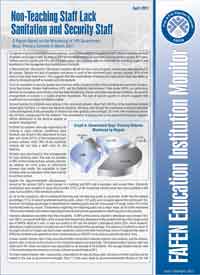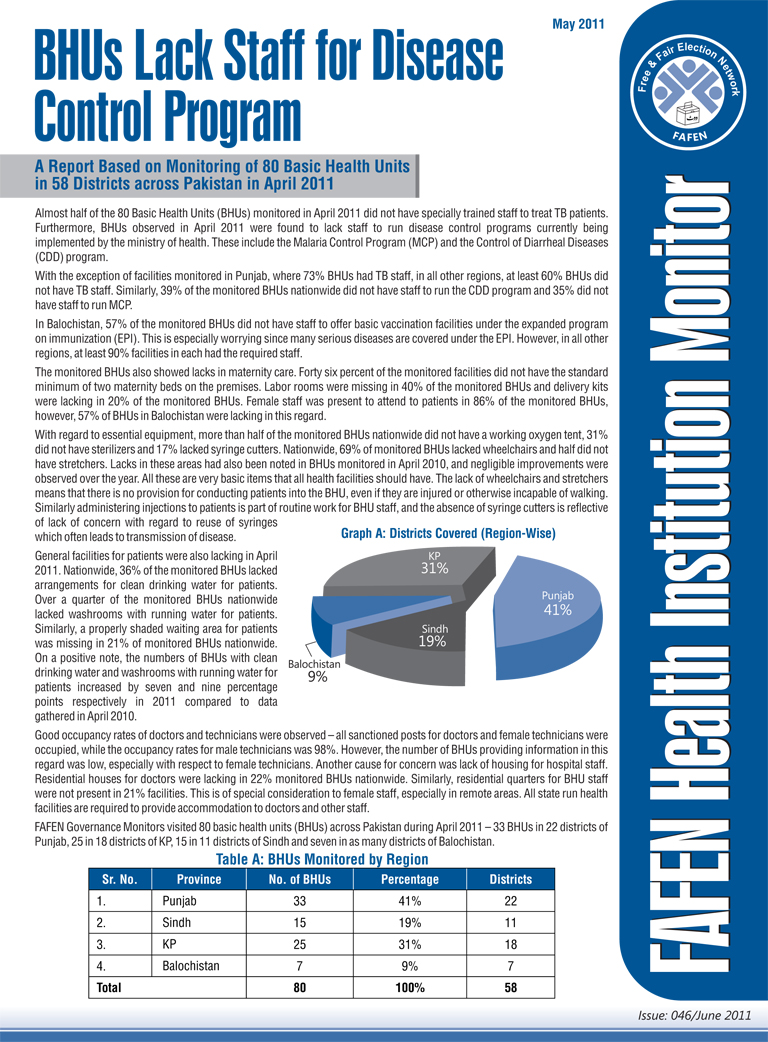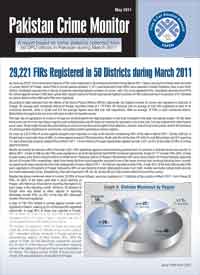ISLAMABAD, June 26, 2011: Nationwide, 14% of the sanctioned teaching posts and 12% of the sanctioned non-teaching posts were lying vacant in the government boys’ high schools monitored by FAFEN during May 2011. According to FAFEN’s Education Institution Monitor released here Sunday, 42% of the monitored schools did not have a security guard and 27% had no sanitary worker.
FAFEN Governance monitors visited 82 government boys’ high schools in 56 districts of the country. Forty-one schools were visited in 25 districts in Punjab, 21 in 14 districts in Khyber Pakhtunkhwa (KP), 16 in 13 districts in Sindh, three in as many districts of Balochistan and one school in Islamabad (ICT).
In Sindh alone, more than a quarter (27%) of the sanctioned teaching posts in the monitored schools were unoccupied, followed by 12% in Punjab, 10% in KP, 9% in ICT and 4% in Balochistan. Similarly, the highest percentage – 22% – of vacant non-teaching posts was also observed in Sindh followed by 12% in Punjab and 5% in KP. Staff was appointed against all the sanctioned non-teaching posts in the monitored schools in Balochistan and ICT.
Despite the fact that educational institutes are frequently targeted by terrorists, especially in Balochistan and KP, security guards were not present in 42% of the monitored schools across the country. The schools that lacked security guards included 67% of the monitored schools in Balochistan, 62% in Sindh, 52% in KP and 27% in Punjab. With regard to other non-teaching staff, sanitary workers were also not available in 22 of the monitored schools, while peons were available in all but six of the 82 monitored schools.
Some lacks were also observed with respect to appointments of subject-specific teachers. As many as 76 schools were offering science subjects (physics, chemistry, and biology) to the students while the teaching staff for these subjects was available in 71 schools, implying that five schools enrolled students who wanted to study science but had not appointed a science teacher to teach these subjects.
On a positive note, other pre-requisites for science subjects were fulfilled in a large proportion of the monitored schools. About 84% of the schools had apparatus for physics and biology experiments while the apparatus for chemistry experiments were available in 83% of the monitored schools. Moreover, a library was available in 71% of the schools monitored during May 2011.
A basic facility, clean drinking water, was not available in as many as 15 of the monitored boys’ secondary schools. The schools that did not ensure safe drinking water in the schools included five schools in Punjab, four each in Sindh and KP and two of the three monitored schools in Balochistan.
Though the importance of physical education in a well rounded academic career has been accepted world over as many as 32 of the monitored 82 schools did not have a playground. However, appointments of Physical Training Instructors (PTI) were made in 62 schools. It means that despite the unavailability of playgrounds in 12 schools, a PTI was appointed. A basic facility, clean drinking water, was not available in as many as 15 of the monitored boys’ high schools.
To download complete report, click here




